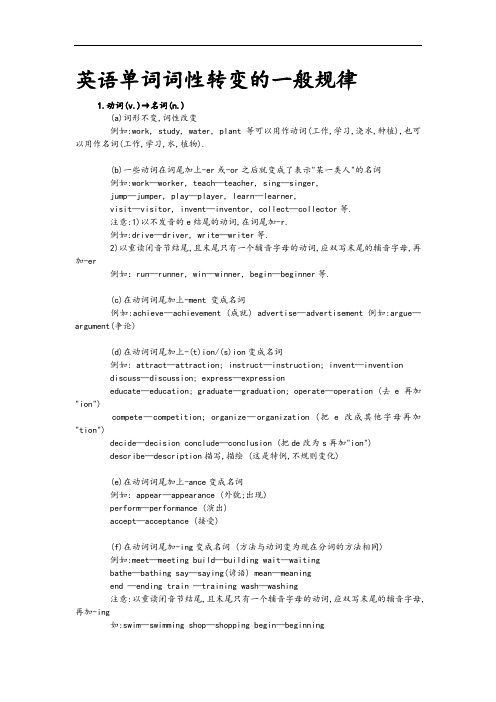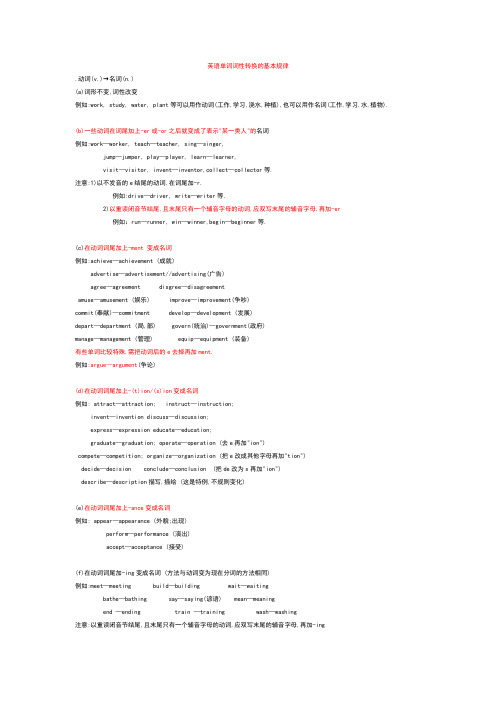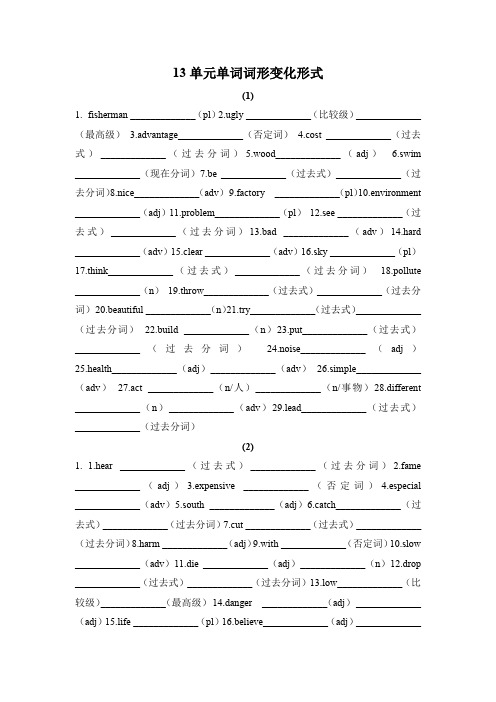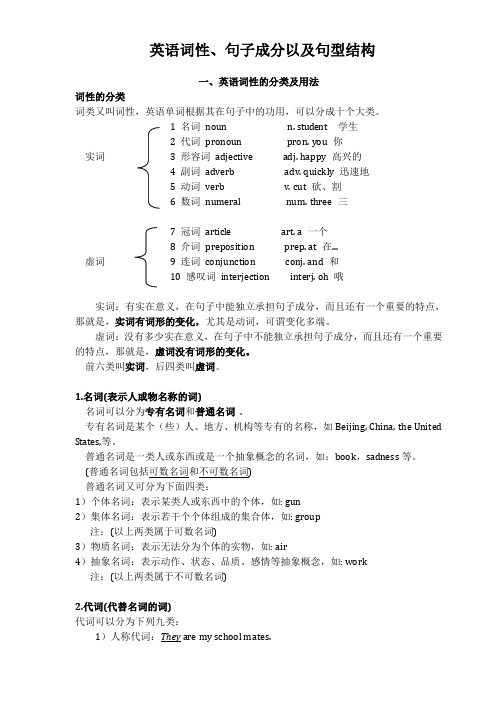九年级英语词性词形变化
英语词性转换

英语单词词性转换的基本规律.动词(v.)→名词(n.)(a)词形不变,词性改变例如:work, study, water, plant等可以用作动词(工作,学习,浇水,种植),也可以用作名词(工作,学习,水,植物).(b)一些动词在词尾加上-er或-or之后就变成了表示"某一类人"的名词例如:work—worker, teach—teacher, sing—singer,jump—jumper, play—player, learn—learner,visit—visitor, invent—inventor,collect—collector等. 注意:1)以不发音的e结尾的动词,在词尾加-r.例如:drive—driver, write—writer等.2)以重读闭音节结尾,且末尾只有一个辅音字母的动词,应双写末尾的辅音字母,再加-er例如:run—runner, win—winner,begin—beginner 等.(c)在动词词尾加上-ment 变成名词例如:achieve—achievement (成就)advertise—advertisement//advertising(广告)agree—agreement disgree—disagreement amuse—amusement (娱乐) improve—improvement(争吵)commit(奉献)—commitment develop—development (发展)depart—department (局,部) govern(统治)—government(政府)manage—management (管理) equip—equipment (装备)有些单词比较特殊,需把动词后的e去掉再加ment.例如:argue—argument(争论)(d)在动词词尾加上-(t)ion/(s)ion变成名词例如: attract—attraction; instruct—instruction;invent—invention discuss—discussion;express—expression educate—education;graduate—graduation; operate—operation (去e再加"ion") compete—competition; organize—organization (把e改成其他字母再加"tion")decide—decision conclude—conclusion (把de改为s再加"ion")describe—description描写,描绘(这是特例,不规则变化) (e)在动词词尾加上-ance变成名词例如: appear—appearance (外貌;出现)perform—performance (演出)accept—acceptance (接受)(f)在动词词尾加-ing变成名词(方法与动词变为现在分词的方法相同)例如:meet—meeting build—building wait—waitingbathe—bathing say—saying(谚语) mean —meaningend —ending train —training wash—washing注意:以重读闭音节结尾,且末尾只有一个辅音字母的动词,应双写末尾的辅音字母,再加-ing如:swim—swimming shop—shopping begin—beginning(g)其他一些比较特殊的变化例如: Beg(乞讨)—beggar(乞丐) behave(行为举止)—behaviorknow(知道)—knowledge(知识) fly—flight (飞行)heat (加热)—heat(热量) hit (撞击)—hit( 轰动一时的人或物,碰撞)mix (混合)—mixture(混合物) press(按,压)—pressure(压力)sit(坐)—seat (座位) succeed—success(成功)tour—tour(旅游)/ tourist (游客)2.动词(v.)→形容词(adj.)(a)动词后面加able,以e结尾的动词则去e加able,表示具有此性质,特点或属性.例如: afford-affordable;love-lovable(b)动词后面加ed,以e结尾的动词则直接加d,表示被动性的属性或特点.例如: scatter-scattered use-used(c)不规则的动词则必须记忆,记住其过去分词形式.规律不大,意义同(b).3.名词(n.)→形容词(adj.)(a)在名词后面加-y可以变成形容词(尤其是一些与天气有关的名词)例如: rain—rainy, cloud—cloudy, wind—windy, snow—snowy, health—healthy, luck—lucky,anger—angry guilt—guilty(内疚的)tourist—touristy(游客多的) , salt (盐)—salty (咸的)silk(丝绸)—silky(丝绸般的), sleep—sleepy (昏昏欲睡的)注意:1)如果以重读闭音节结尾,且词尾只有一个辅音字母,这时应双写辅音字母再加"-y".如: sun—sunny, fun—funny, fog—foggy(有雾的), fur—furry(毛皮的)2)少数以不发音的e结尾的名词变为形容词时,应去掉e 再加"-y".如: noise—noisy, ice—icy, shine—shiny(发亮的), taste(口味)—tasty(甜的)(b)名词后面加-ed,以e结尾的直接加d.例如: spot(斑点)—spotted(有斑点的); talent—talented (有天赋的)organize—organized 有组织的; balance—balanced(平衡的)(c)一些抽象名词在词尾加-ful可以变为形容词例如:care—careful, thank—thankful, help—helpful, use—useful, meaning—meaningful(d)在名词后加-less构成含有否定意义的形容词例如:care—careless(粗心的), use—useless(无用的)hope—hopeless(没希望的),home—homeless(无家可归的) (e)一些以-ce结尾的名词,把-ce改为-t变成形容词例如: difference—different, silence—silent, confidence—confident(f).在名词后加-ly变为形容词例如: friend—friendly, love—lovely, live---lively(g).在名词后加-ous变为形容词例如: danger—dangerous(h)名词后面加-al变为形容词例如: music—musical; medicine—medical (这个比较特殊) (i)名词后面加-able变为形容词,如果以e结尾就去e再加"-able".例如: adjust—adjustable 可调整的value—valuable有价值的(j)名词后面加-en变成形容词例如: wood—wooden 木制的wool—woolen 羊毛的(k)一些表示国家的名词可以在词尾加-ese, -ish或-n构成表示国籍,语言的形容词例如:China—Chinese, Japan—Japanese, England—English,America—American, India—Indian, Australia —Australian(注意Canada—Canadian)4..形容词(adj.)→副词(adv.)▲一般在形容词的词尾加-ly可以变成副词例如: quick—quickly, slow—slowly, loud—loudly, sudden—suddenly 等但是,以下几点值得注意:(a) 一些以"辅音字母+y"结尾的形容词,要把y改为i再加-ly 例如: happy—happily, angry—angrily, lucky—luckily, heavy—heavily, noisy—noisily(b) 有些以-ble或-le结尾的形容词,去掉e加-y例如:possible—possibly, terrible—terribly(c)少数以e结尾的形容词,要去掉e再加-ly例如: true—truly但绝大多数以e结尾的形容词仍然直接加-ly 例如: polite—politely, wide—widely(d)以-l结尾的形容词变为副词时要在词尾加-ly,以-ll结尾的才在词尾只加-y.例如: usual—usually, careful—carefully, useful—usefullyfull—fully (以-ll结尾的才只加y)OK,以上就是英语单词词性变化的一般规律,希望对大家有所帮助PS:有些同学可能对元音辅音以及重读闭音节不是很了解,那我在这里再做下补充说明.1.英语26个字母中,a e i o u是元音字母, y是半元音字母, 其余都是辅音字母.★所谓半元音就是有时候做元音,有时候做辅音.半元音字母y做元音有: shy,sky做辅音比如最简单的:yes2.开音节和闭音节开音节分两种:绝对开音节和相对开音节绝对开音节指的是"元音字母结尾"的音节(例如we, hi等) 相对开音节是指"辅音字母-元音字母-辅音字母-不发音的e"的音节,(r除外). ( 例如,take,make等)比如:take (在这个单词中,t是辅音,a是元音,k是辅音,e是不发音的元音)◆在开音节中, 元音字母发他们在字母表中的音闭音节, 则是指"辅音字母-元音字母-辅音字母"的音节( -al 等除外) (例如:leg,cross等)◆在闭音节中,元音字母发不同的音a e i o u例sat let sit not nut (试着读下这些单词,这些单词中,元音发的音都不是它们在字母表中发的音)2.英语重读闭音节就是以辅音因素结尾的,而且是重读音节的音节.比如apple 划音节就因该是ap/ple 前面那个ap是一个音节,这个音节以辅音因素p结尾,所以就是闭音节.(仅仅能看出是闭音节,是不是重读闭音节还要看这个音节是不是重读的) 重读闭音节三要素:1. 必须是重读音节;2. 最后只有一个辅音字母;3.元音字母发短元音( 说通俗点,打个比方, /u/是短元音,/u:/是长元音)重读闭音节即两个辅音中间夹一个元音.如:sit---sitting begin---beginning(重读在gin这个音节上)●像travel这个单词,"vel"也是"辅音+元音+辅音"的结构,但是重音不在vel这个音节上,所以不用双写"l",可以为travelled,也可以是traveled,更常用的是后者.英语单词词根词缀和词性转换英语中常见的后缀一、名词性后缀1,-age为抽象名词后缀,表示行为,状态和全体总称percentage百分数,百分率,voltage电压,伏特数,lavage灌洗,洗,出法,gavage管词法,curettage刮除法,shortage不足,缺少。
中考英语词汇词形变化总结

中考英语词汇词形变化总结英语词汇的词形变化是学习英语的重要一环,掌握好不同词形的用法可以帮助我们更准确地表达自己的意思。
在中考英语考试中,词汇词形变化也是经常出现的考点之一。
本文将对中考英语常见的词汇词形变化进行总结,以帮助同学们提高应对这一考点的能力。
一、名词的词形变化1. 单数名词变复数名词:大部分名词的复数形式是在其词尾加-s 或-es,如book-books, box-boxes, brush-brushes等。
但是也有一些特殊情况需要注意:- 以辅音字母+y结尾的名词,将-y变为-i,再加-es,如baby-babies, country-countries。
- 以-s, -sh, -ch, -x结尾的名词,在其词尾加-es,如bus-buses, dish-dishes, watch-watches, box-boxes。
- 以-o结尾的名词,在其词尾加-es,如potato-potatoes, tomato-tomatoes。
- 以-f或-fe结尾的名词,将-f或-fe变为-ves,如leaf-leaves, knife-knives。
2. 可数名词变不可数名词:有些名词可以同时作为可数名词和不可数名词,表示单个事物时用作可数名词,表示一类事物时用作不可数名词。
例如,water可以表示一杯水(可数名词),也可以表示水这一类物质(不可数名词)。
3. 名词的单数形式:- 有些名词没有复数形式或者复数形式与单数形式相同,如sheep, fish, Chinese等。
- 有些名词形式变化不规则,如man-men, woman-women, tooth-teeth 等。
二、动词的词形变化1. 动词的时态变化:英语动词的时态变化较为复杂,常见的时态有一般现在时、一般过去时、一般将来时、现在进行时、过去进行时等。
- 一般现在时的基本形式为动词原形,表示经常性或普遍性的动作或状态,如I eat breakfast every day.(我每天吃早饭。
英语单词词性转变的一般规律

英语单词词性转变的一般规律1.动词(v.)→名词(n.)(a)词形不变,词性改变例如:work, study, water, plant等可以用作动词(工作,学习,浇水,种植),也可以用作名词(工作,学习,水,植物).(b)一些动词在词尾加上-er或-or之后就变成了表示"某一类人"的名词例如:work—worker, teach—teacher, sing—singer,jump—jumper, play—player, learn—learner,visit—visitor, invent—inventor, collect—collector等.注意:1)以不发音的e结尾的动词,在词尾加-r.例如:drive—driver, write—writer等.2)以重读闭音节结尾,且末尾只有一个辅音字母的动词,应双写末尾的辅音字母,再加-er例如:run—runner, win—winner, begin—beginner等.(c)在动词词尾加上-ment 变成名词例如:achieve—achievement (成就) advertise—advertisement例如:argue—argument(争论)(d)在动词词尾加上-(t)ion/(s)ion变成名词例如: attract—attraction; instruct—instruction; invent—inventiondiscuss—discussion; express—expressioneducate—education; graduate—graduation; operate—operation (去e再加"ion")compete—competition; organize—organization (把e改成其他字母再加"tion")decide—decision conclude—conclusion (把de改为s再加"ion")describe—description描写,描绘 (这是特例,不规则变化)(e)在动词词尾加上-ance变成名词例如: appear—appearance (外貌;出现)perform—performance (演出)accept—acceptance (接受)(f)在动词词尾加-ing变成名词 (方法与动词变为现在分词的方法相同)例如:meet—meeting build—building wait—waitingbathe—bathing say—saying(谚语) mean—meaningend —ending train —training wash—washing注意:以重读闭音节结尾,且末尾只有一个辅音字母的动词,应双写末尾的辅音字母,再加-ing如:swim—swimming shop—shopping begin—beginning(g)其他一些比较特殊的变化例如: Beg(乞讨)—beggar(乞丐) behave(行为举止)—behaviorknow(知道)—knowledge(知识) fly—flight (飞行)heat (加热)—heat(热量) hit (撞击)—hit( 轰动一时的人或物,碰撞)mix (混合)—mixture(混合物) press(按,压)—pressure(压力)sit(坐)—seat (座位) succeed—success(成功)tour—tour(旅游)/ tourist (游客)2.动词(v.)→形容词(adj.)(a)动词后面加able,以e结尾的动词则去e加able,表示具有此性质,特点或属性.例如: afford-affordable;love-lovable(b)动词后面加ed,以e结尾的动词则直接加d,表示被动性的属性或特点.例如: scatter-scattereduse-used(c)不规则的动词则必须记忆,记住其过去分词形式.规律不大,意义同(b).3.名词(n.)→形容词(adj.)(a)在名词后面加-y可以变成形容词(尤其是一些与天气有关的名词)例如: rain—rainy, cloud—cloudy, wind—windy, snow—snowy,health—healthy, luck—lucky, anger—angry guilt—guilty(内疚的)tourist—touristy(游客多的) , salt (盐)—salty (咸的)silk(丝绸)—silky(丝绸般的), sleep—sleepy (昏昏欲睡的)注意:1)如果以重读闭音节结尾,且词尾只有一个辅音字母,这时应双写辅音字母再加"-y".如: sun—sunny, fun—funny, fog—foggy(有雾的), fur—furry(毛皮的)2)少数以不发音的e结尾的名词变为形容词时,应去掉e再加"-y".如: noise—noisy, ice—icy, shine—shiny(发亮的), taste(口味)—tasty(甜的)(b)名词后面加-ed,以e结尾的直接加d.例如: spot(斑点)—spotted(有斑点的); talent—talented (有天赋的)organize—organized 有组织的; balance—balanced(平衡的)(c)一些抽象名词在词尾加-ful可以变为形容词例如:care—careful, thank—thankful, help—helpful,use—useful, meaning—meaningful(d)在名词后加-less构成含有否定意义的形容词例如:care—careless(粗心的), use—useless(无用的)hope—hopeless(没希望的),home—homeless(无家可归的)(e)一些以-ce结尾的名词,把-ce改为-t变成形容词例如: difference—different, silence—silent, confidence—confident(f).在名词后加-ly变为形容词例如: friend—friendly, love—lovely, live---lively(g).在名词后加-ous变为形容词例如: danger—dangerous(h)名词后面加-al变为形容词例如: music—musical; medicine—medical (这个比较特殊)(i)名词后面加-able变为形容词,如果以e结尾就去e再加"-able".例如: adjust—adjustable 可调整的value—valuable有价值的(j)名词后面加-en变成形容词例如: wood—wooden 木制的wool—woolen 羊毛的(k)一些表示国家的名词可以在词尾加-ese, -ish或-n构成表示国籍,语言的形容词例如:China—Chinese, Japan—Japanese, England—English,America—American, India—Indian, Australia —Australian(注意Canada—Canadian)4..形容词(adj.)→副词(adv.)▲一般在形容词的词尾加-ly可以变成副词例如: quick—quickly, slow—slowly, loud—loudly, sudden—suddenly 等但是,以下几点值得注意:(a) 一些以"辅音字母+y"结尾的形容词,要把y改为i再加-ly例如: happy—happily, angry—angrily, lucky—luckily, heavy—heavily, noisy—noisily(b) 有些以-ble或-le结尾的形容词,去掉e加-y例如:possible—possibly, terrible—terribly(c)少数以e结尾的形容词,要去掉e再加-ly例如: true—truly但绝大多数以e结尾的形容词仍然直接加-ly 例如: polite—politely, wide—widely(d)以-l结尾的形容词变为副词时要在词尾加-ly,以--ll结尾的才在词尾只加-y.例如: usual—usually, careful—carefully, useful—usefullyfull—fully (以-ll结尾的才只加y)英语词汇后缀系列(一)——形容词后缀able以“-able”结尾的形容词一般有两种情况:(1)v.+able→adj. 以这种方式构成的形容词其意义为“能……的”、“可以(被)……的”、“适合于……的”、“值得……的”等,即有被动含义。
九年级词性转换及重要短语1-10

2. n.发展v发展adi.发达的adj.发展中的3.v认识到,意识到,实现adi.真实的4. v.记忆,背诵n. 记忆,背诵5. adi.口语的v.说,讲6. v.解决n. 解决方法7. adv.大声地,出生地adj.大声的adv.大声地,响亮地8. adj.快的,迅速的adv.快地,迅速地9. adj.聪明的adv.聪明地10. n.兴趣v使…感兴趣adi.有兴趣的adj.感兴趣的11. v.表达n.表达、12. n.成功v成功adi.成功的adv .成功地、词组;1.范语法错误 2.在字典中查阅新单词3.使发音正确 4. 用英语记日记5.通过学习小组学习6.做笔记7.那样学到很多/很少8.那样有很大的/没什么帮助9.朗读,大声读10.做单词卡11.听磁带12. 向老师求助13.看录像14.练习发音15.太…而不能…16.为考试而学习17.懂得英语口语18.提高说的技能19.学习语言的秘诀20. 爱上…喜欢上…21.肢体语言22.小菜一碟23.以便于24.记忆句型25.加快阅读速度26.加入英语俱乐部27.是否28. 熟能生巧29. 寻找30.依赖于;取决于31.共有;与…相同32.害怕…恐怕…33. 担忧;担心34.一点一点地35.编对话36.一遍又一遍,反复1. adi.奇怪的,陌生的n.陌生人2. n.传统adi.传统的3. v招待;请(客)n.款待;招待n.治疗,疗法;处理,待遇,对待4. n.记忆,背诵n.记忆,背诵5. adi.口语的V.说,讲6..v放置,安放;产卵,下蛋过去式过去分词现在分词7. v.存在,平躺;处于过去式过去分词现在分词8. adi.死的,去世的v.死亡,去世n.死亡9. v.处罚,惩罚n. 处罚,惩罚10. adi.温暖的,温和的adv.温暖地;亲切地;热烈地n. 温暖,暖和11. n. 运气adi.幸运地adv. 不幸地12. v.意思是,意味着n. 意思,意义adi.有意义的adi.吝啬的;小气的自私的重点词组;1.泼水节2.端午节3.春节4.元宵节5.吃粽子6.走访亲戚7.增加(体重),发胖8.摆开,布置9…与……相似10.有好运11.庆祝中秋节12.传统民间故事13.最终成为14.母亲节15.父亲节16.圣诞老人17.作为结果18.飞上天19.一个……另一个……20.乔装改扮21.不招待纠结捣乱22.圣诞精神,圣诞节的意义23.分享及给予爱和快乐的重要性24.使…记起,使…想起25.传播爱与欢乐26…….的开始27.不但……而且……28.给予生命29.在……和……两者之间30…….的象征31.鬼屋1. v.原谅n. 借口2. v.骑,乘n.供玩乐的乘坐工具3. adi.贵的,昂贵的adi.不贵的4. adi.拥挤的adi.不拥挤的5. adi.直接的adi.不直接的6. n.公园v.停车n.停车7.adi.有礼貌的adv.有礼貌地adi.没礼貌的8. adi.可能的adv.可能地重点词组:1.取些钱2.买些杂志3.获取有关这个城市的信息4.买一些邮票5.沿着中心大街走6.去三楼7.向左/右转8.在……和……之间9.路过书店10.游乐园11.加油12.路过13.在某人去……的路上14.寄一封信15.在购物中心16.有礼貌地求助17.一个直接的问题18.改变方式19.在不同的状况下20.依靠,依赖,取决于21.使用切当的语言22.花时间/钱做某事23.递盐24.期盼;期望25.在三层26.急忙,匆匆忙忙地2. v描述,描写n. 描述,描写3. adj有趣的,搞笑的n.乐趣;娱乐活动;嬉戏;嬉闹;有趣的事adi.使人愉快的;开心的4. adi.沉默的n. 沉默5. adi.幽默的n..幽默6. v.采访n. 面试者;会见者;采访者;7. n.欧洲adj.欧洲的;全欧的;欧盟的n.欧洲人;祖籍欧洲人的;欧洲人的后裔;欧盟支持者;欧盟拥护者8.n.自豪;骄傲;adj.自豪的,骄傲的9. v.决定n.决定10. v建议n.建议11. adj.害羞的n.害羞、词组;1.过去常常 2.直发3.不时;偶尔;间或;时而4. 变红5.取得好成绩6.不再7.向左\ 右转8.开始从事;接受(提议);占用9.担忧;担心10.被众人所关注;吸引无数目光11.放弃12. 许多;大量13.单独14.听流行音乐15.在公众面前做演讲16.在足球对17.一个普通的15岁男孩18.以……骄傲;以……而自豪19.以……为骄傲20. 一所寄宿制学校21.亲自22.引发问题23.缺课24.在最近的几年中25.在英语比赛中获胜26.害怕adi用过的,用旧了的;习惯于;二手的;筋疲力尽的adi.有用的2. n历史adi.历史的,有关历史研究的;有根据的;基于史实的3. v将(某物)切开(或分割)adi.锋利的,锐利的;刺骨的;像刀割似的;讽刺的n.切割,剪报,剪辑v.(现在分词)切开,消减,采伐。
英语词性转换

英语单词词性转换的基本规律.动词(v.)→名词(n.)(a)词形不变,词性改变例如:work, study, water, plant等可以用作动词(工作,学习,浇水,种植),也可以用作名词(工作,学习,水,植物).(b)一些动词在词尾加上-er或-or之后就变成了表示"某一类人"的名词例如:work—worker, teach—teacher, sing—singer,jump—jumper, play—player, learn—learner,visit—visitor, invent—inventor,collect—collector等.注意:1)以不发音的e结尾的动词,在词尾加-r.例如:drive—driver, write—writer等.2)以重读闭音节结尾,且末尾只有一个辅音字母的动词,应双写末尾的辅音字母,再加-er例如:run—runner, win—winner,begin—beginner等.(c)在动词词尾加上-ment 变成名词例如:achieve—achievement (成就)advertise—advertisement//advertising(广告)agree—agreement disgree—disagreementamuse—amusement (娱乐) improve—improvement(争吵)commit(奉献)—commitment develop—development (发展)depart—department (局,部) govern(统治)—government(政府)manage—management (管理) equip—equipment (装备)有些单词比较特殊,需把动词后的e去掉再加ment.例如:argue—argument(争论)(d)在动词词尾加上-(t)ion/(s)ion变成名词例如: attract—attraction; instruct—instruction;invent—invention discuss—discussion;express—expression educate—education;graduate—graduation; operate—operation (去e再加"ion")compete—competition; organize—organization (把e改成其他字母再加"tion")decide—decision conclude—conclusion (把de改为s再加"ion")describe—description描写,描绘 (这是特例,不规则变化)(e)在动词词尾加上-ance变成名词例如: appear—appearance (外貌;出现)perform—performance (演出)accept—acceptance (接受)(f)在动词词尾加-ing变成名词 (方法与动词变为现在分词的方法相同)例如:meet—meeting build—building wait—waitingbathe—bathing say—saying(谚语) mean—meaningend —ending train —training wash—washing注意:以重读闭音节结尾,且末尾只有一个辅音字母的动词,应双写末尾的辅音字母,再加-ing如:swim—swimming shop—shopping begin—beginning(g)其他一些比较特殊的变化例如: Beg(乞讨)—beggar(乞丐) behave(行为举止)—behaviorknow(知道)—knowledge(知识) fly—flight (飞行)heat (加热)—heat(热量) hit (撞击)—hit( 轰动一时的人或物,碰撞)mix (混合)—mixture(混合物) press(按,压)—pressure(压力)sit(坐)—seat (座位) succeed—success(成功)tour—tour(旅游)/ tourist (游客)2.动词(v.)→形容词(adj.)(a)动词后面加able,以e结尾的动词则去e加able,表示具有此性质,特点或属性.例如: afford-affordable;love-lovable(b)动词后面加ed,以e结尾的动词则直接加d,表示被动性的属性或特点.例如: scatter-scattered use-used(c)不规则的动词则必须记忆,记住其过去分词形式.规律不大,意义同(b).3.名词(n.)→形容词(adj.)(a)在名词后面加-y可以变成形容词(尤其是一些与天气有关的名词)例如: rain—rainy, cloud—cloudy, wind—windy, snow—snowy,health—healthy, luck—lucky,anger—angry guilt—guilty(内疚的)tourist—touristy(游客多的) , salt (盐)—salty (咸的)silk(丝绸)—silky(丝绸般的), sleep—sleepy (昏昏欲睡的)注意:1)如果以重读闭音节结尾,且词尾只有一个辅音字母,这时应双写辅音字母再加"-y".如: sun—sunny, fun—funny, fog—foggy(有雾的), fur—furry(毛皮的)2)少数以不发音的e结尾的名词变为形容词时,应去掉e再加"-y".如: noise—noisy, ice—icy, shine—shiny(发亮的), taste(口味)—tasty(甜的)(b)名词后面加-ed,以e结尾的直接加d.例如: spot(斑点)—spotted(有斑点的); talent—talented (有天赋的)organize—organized 有组织的; balance—balanced(平衡的)(c)一些抽象名词在词尾加-ful可以变为形容词例如:care—careful, thank—thankful, help—helpful,use—useful, meaning—meaningful(d)在名词后加-less构成含有否定意义的形容词例如:care—careless(粗心的), use—useless(无用的)hope—hopeless(没希望的),home—homeless(无家可归的)(e)一些以-ce结尾的名词,把-ce改为-t变成形容词例如: difference—different, silence—silent, confidence—confident(f).在名词后加-ly变为形容词例如: friend—friendly, love—lovely, live---lively(g).在名词后加-ous变为形容词例如: danger—dangerous(h)名词后面加-al变为形容词例如: music—musical; medicine—medical (这个比较特殊)(i)名词后面加-able变为形容词,如果以e结尾就去e再加"-able".例如: adjust—adjustable 可调整的 value—valuable有价值的(j)名词后面加-en变成形容词例如: wood—wooden 木制的 wool—woolen 羊毛的(k)一些表示国家的名词可以在词尾加-ese, -ish或-n构成表示国籍,语言的形容词例如:China—Chinese, Japan—Japanese, England—English,America—American, India—Indian, Australia —Australian(注意Canada—Canadian)4..形容词(adj.)→副词(adv.)▲一般在形容词的词尾加-ly可以变成副词例如: quick—quickly, slow—slowly, loud—loudly, sudden—suddenly 等但是,以下几点值得注意:(a) 一些以"辅音字母+y"结尾的形容词,要把y改为i再加-ly例如: happy—happily, angry—angrily, lucky—luckily, heavy—heavily, noisy—noisily(b) 有些以-ble或-le结尾的形容词,去掉e加-y例如:possible—possibly, terrible—terribly(c)少数以e结尾的形容词,要去掉e再加-ly例如: true—truly但绝大多数以e结尾的形容词仍然直接加-ly 例如: polite—politely, wide—widely(d)以-l结尾的形容词变为副词时要在词尾加-ly,以-ll结尾的才在词尾只加-y.例如: usual—usually, careful—carefully, useful—usefullyfull—fully (以-ll结尾的才只加y)OK,以上就是英语单词词性变化的一般规律,希望对大家有所帮助PS:有些同学可能对元音辅音以及重读闭音节不是很了解,那我在这里再做下补充说明.1.英语26个字母中,a e i o u是元音字母, y是半元音字母, 其余都是辅音字母.★所谓半元音就是有时候做元音,有时候做辅音.半元音字母y做元音有: shy,sky做辅音比如最简单的:yes2.开音节和闭音节开音节分两种:绝对开音节和相对开音节绝对开音节指的是"元音字母结尾"的音节 (例如 we, hi等)相对开音节是指"辅音字母-元音字母-辅音字母-不发音的e"的音节,(r除外). ( 例如,take,make等)比如:take (在这个单词中,t是辅音,a是元音,k是辅音,e是不发音的元音)◆在开音节中, 元音字母发他们在字母表中的音闭音节, 则是指"辅音字母-元音字母-辅音字母"的音节 ( -al等除外) (例如:leg,cross等)◆在闭音节中,元音字母发不同的音a e i o u例 sat let sit not nut (试着读下这些单词,这些单词中,元音发的音都不是它们在字母表中发的音)2.英语重读闭音节就是以辅音因素结尾的,而且是重读音节的音节.比如apple 划音节就因该是ap/ple 前面那个ap是一个音节,这个音节以辅音因素p结尾,所以就是闭音节.(仅仅能看出是闭音节,是不是重读闭音节还要看这个音节是不是重读的)重读闭音节三要素:1. 必须是重读音节;2. 最后只有一个辅音字母;3.元音字母发短元音 ( 说通俗点,打个比方, /u/是短元音,/u:/是长元音)重读闭音节即两个辅音中间夹一个元音.如:sit---sitting begin---beginning(重读在gin这个音节上)●像travel这个单词,"vel"也是"辅音+元音+辅音"的结构,但是重音不在vel这个音节上,所以不用双写"l",可以为travelled,也可以是traveled,更常用的是后者.英语单词词根词缀和词性转换英语中常见的后缀一、名词性后缀1,-age为抽象名词后缀,表示行为,状态和全体总称percentage百分数,百分率,voltage电压,伏特数,lavage灌洗,洗,出法,gavage管词法,curettage刮除法,shortage 不足,缺少。
Unit13-14单元单词词形变化形式 人教版九年级英语全册

13单元单词词形变化形式(1)1.fisherman _____________(pl)2.ugly _____________(比较级)_____________(最高级)3.advantage_____________(否定词)4.cost _____________(过去式)_____________(过去分词)5.wood_____________(adj)6.swim _____________(现在分词)7.be _____________(过去式)_____________(过去分词)8.nice_____________(adv)9.factory _____________(pl)10.environment _____________(adj)11.problem_____________(pl)12.see _____________(过去式)_____________(过去分词)13.bad _____________(adv)14.hard _____________(adv)15.clear _____________(adv)16.sky _____________(pl)17.think_____________(过去式)_____________(过去分词)18.pollute _____________(n)19.throw_____________(过去式)_____________(过去分词)20.beautiful _____________(n)21.try_____________(过去式)_____________(过去分词)22.build _____________(n)23.put_____________(过去式)_____________(过去分词)24.noise_____________(adj)25.health_____________(adj)_____________(adv)26.simple_____________(adv)27.act _____________(n/人)_____________(n/事物)28.different _____________(n)_____________(adv)29.lead_____________(过去式)_____________(过去分词)(2)1. 1.hear _____________(过去式)_____________(过去分词)2.fame _____________(adj)3.expensive _____________(否定词)4.especial _____________(adv)5.south _____________(adj)6.catch_____________(过去式)_____________(过去分词)7.cut _____________(过去式)_____________(过去分词)8.harm _____________(adj)9.with _____________(否定词)10.slow _____________(adv)11.die _____________(adj)_____________(n)12.drop _____________(过去式)_____________(过去分词)13.low_____________(比较级)_____________(最高级)14.danger _____________(adj)_____________(adj)15.life _____________(pl)16.believe_____________(adj)_____________(否定词)17.she _____________(名词性物主代词)_____________(反身代词)18.they _____________(名词性物主代词)_____________(反身代词)19.fall _____________(过去式)_____________(过去分词)20.protect _____________(n)21.teach_____________(过去式)_____________(过去分词)_____________(n)22.develop _____________(n)23.stop_____________(过去式)_____________(过去分词)_____________(现在分词)24.sell _____________(过去式)_____________(过去分词)25.science _____________(adj)26.show _____________(过去式)_____________(过去分词)27.eat_____________(过去式)_____________(过去分词)28.appear _____________(否定词)29.do _____________(过去式)_____________(过去分词)30.agree_____________(过去分词)31.difficult _____________(n)32.child _____________(pl)(3)1.ride_____________(过去式)_____________(过去分词)2.light _____________(pl)3.napkin _____________(pl)4.real _____________(adv)5.easy _____________(否定词)_____________(adv)6.shop _____________(过去式)_____________(过去分词)_____________(现在分词)7.true_____________(adv)_____________(n)e _____________(adj)9.take_____________(过去式)_____________(过去分词)10.write _____________(过去式)_____________(过去分词)_____________(n)11.close _____________(比较级)_____________(最高级)(4)1.actual _____________(adv)2.create _____________(n)3.probable_____________(adv)ual _____________(adv)5.build _____________(n)6.she _____________(名词性物主代词)_____________(反身代词)7.build _____________(过去式)_____________(过去分词)8.bottle _____________(pl)9.recent _____________(adv)10.win_____________(过去式)_____________(过去分词)_____________(n)11.inspire_____________(n)12.recycle _____________(现在分词)13.be _____________(过去式)_____________(过去分词)14.sell _____________(过去式)_____________(过去分词)15.set_____________(过去式)_____________(过去分词)16.especial_____________(adv)e _____________(adj)18.plan _____________(过去式)_____________(过去分词)_____________(现在分词)19.write _____________(过去式)_____________(过去分词)20.enjoy_____________(adj)21.busy _____________(n)22.know_____________(过去式)_____________(过去分词)23.material _____________(pl)24.beautiful _____________(n)25.human _____________(pl)26.German _____________(pl)27.important _____________(n)28.environment _____________(adj)29.protect _____________(n)30.bring_____________(过去式)_____________(过去分词)31.happy_____________(n)_____________(adv)32.life _____________(pl)33.create _____________(adj)34.child_____________(pl)35.suggest _____________(n)36.possible _____________(adv)37.health _____________(adj)_____________(adv)38.different _____________(n)39.wide _____________(adv)40.sudden _____________(adv)14单元单词词形变化形式(1)1.survey _____________(pl)2.standard _____________(pl)3.method _____________(pl)4.instruction _____________(pl)5.memory_____________(pl)6.special _____________(adv)7.find_____________(过去式)_____________(过去分词)8.careful _____________(adv)9.scare_____________(adj/人)_____________ (adj/物)10.end_____________(n)11.give _____________(过去式)_____________(过去分词)12.safe _____________(adv)_____________ (n)13.hurt _____________(过去式)_____________(过去分词)14.break _____________(过去式)_____________(过去分词)15.run_____________(过去式)_____________(过去分词)_____________(现在分词)16.good_____________(比较级)_____________(最高级)e_____________(过去式)_____________(过去分词)18.university _____________(pl)19.medicine _____________(adj)20.win _____________(过去式)_____________(过去分词)_____________(n)21.experience _____________(pl)22.goal _____________(pl)pete_____________(n/人)_____________ (n/事物)24.advise _____________(v)25.health_____________(adj)_____________(adv)26.hurt _____________(过去式)_____________(过去分词)27.patient _____________(n)28.you _____________(名词性物主代词)_____________(反身代词)29.difficult _____________(n)30.clear _____________(adv)31.understand _____________(过去式)_____________(过去分词)32.courage _____________(v)33.get _____________(过去式)_____________(过去分词)34.they _____________(名词性物主代词)_____________(反身代词)(2)1.overcome _____________(过去式)_____________(过去分词)2.graduate_____________(n)3.care _____________(adj)_____________(adj)_____________(否定词)4.we_____________(名词性物主代词)_____________(反身代词)5.write _____________(n)6.ring _____________(过去式)_____________(过去分词)7.excite _____________(n)8.pride _____________(adj)9.shy _____________(比较级)_____________(最高级)_____________(n)10.slow _____________(adv)11.get _____________(过去式)_____________(过去分词)12.prepare _____________(n)13.art _____________(n)14.festival _____________(pl)15.party _____________(pl)16.different _____________(n)17.foreign _____________(n)18.challenge _____________(pl)19.graduate _____________(n)20.leave_____________(过去式)_____________(过去分词)21.love _____________(adj)22.difficult _____________(n)22.kind _____________(n)33.wonder ____________(adj)34.memory _____________(pl)35.happen _____________(n)36.change _____________(v)37.plan _____________(过去式)_____________(过去分词)_____________(n)38.volunteer _____________(pl)39.pronounce _____________(n)40.one _____________(序数词)41.different _____________(n)(3)1.manage_____________(n)2.become _____________(过去式)_____________(过去分词)3.feel _____________(过去式)_____________(过去分词)_____________(n)4.win _____________(n)5.invite _____________(n)6. give _____________(过去式)_____________(过去分词)7.graduate_____________(n)8.believe _____________(adj)_____________(否定词)(4)dy _____________(pl)2.gentleman _____________(pl)3.ceremony_____________(pl)4.two_____________(序数词)5.congratulate _____________(n)6.energy _____________(adj)7.know_____________(过去式)_____________(过去分词)8.deal _____________(过去式)_____________(过去分词)9.talent _____________(adj)10.adult _____________(pl)11.grow _____________(过去式)_____________(过去分词)12.proud _____________(n)13.do_____________(过去式)_____________(过去分词)14.alone _____________(adj)15.important _____________(n)16.life _____________(pl)17.help_____________(adj)18.mean _____________(n)19.thank _____________(adj)st_____________(adv)21.begin_____________(过去式)_____________(过去分词)_____________(现在分词)22.task _____________(pl)23.mistake _____________(pl)24.key _____________(pl)25.difficult _____________(n)26.excite _____________(n)27.chance _____________(pl)28.able _____________(n)29.choose _____________(n)30.wise _____________(adv)31.decide _____________(n)32.act _____________(n)_____________(n)33.set _____________(过去式)_____________(过去分词)34.you _____________(名词性物主代词)_____________(反身代词)35.luck _____________(n)_____________(adj)_____________(adv)36.ring_____________(过去式)_____________(过去分词)37.thank _____________(adj)38.we _____________(名词性物主代词)_____________(反身代词)39.feel_____________(过去式)_____________(过去分词)_____________(n)40.worry_____________(adj)41.sad _____________(n)。
中考英语复习词性与句子成分句型

英语词性、句子成分以及句型结构一、英语词性的分类及用法词性的分类词类又叫词性,英语单词根据其在句子中的功用,可以分成十个大类。
1 名词noun n. stud ent 学生2 代词pronoun pron. you 你实词 3 形容词adjective adj. happy 高兴的4 副词adverb adv. quickly 迅速地5 动词verb v. cut 砍、割6 数词numeral num. three 三7 冠词article art. a 一个8 介词preposition prep. at 在...虚词9 连词conjunction conj. and 和10 感叹词interjection interj. oh 哦实词:有实在意义,在句子中能独立承担句子成分,而且还有一个重要的特点,那就是,实词有词形的变化,尤其是动词,可谓变化多端。
虚词:没有多少实在意义,在句子中不能独立承担句子成分,而且还有一个重要的特点,那就是,虚词没有词形的变化。
前六类叫实词,后四类叫虚词。
1.名词(表示人或物名称的词)名词可以分为专有名词和普通名词.专有名词是某个(些)人、地方、机构等专有的名称,如Beijing, China, the United States,等。
普通名词是一类人或东西或是一个抽象概念的名词,如:book,sadness等。
(普通名词包括可数名词和不可数名词)普通名词又可分为下面四类:1)个体名词:表示某类人或东西中的个体,如: gun2)集体名词:表示若干个个体组成的集合体,如: group注:(以上两类属于可数名词)3)物质名词:表示无法分为个体的实物,如: air4)抽象名词:表示动作、状态、品质、感情等抽象概念,如: work 注:(以上两类属于不可数名词)2.代词(代替名词的词)代词可以分为下列九类:1)人称代词:They are my school mates.2)物主代词:Our friends have great concern for each other.3)反身代词:Take good care of yourselves.4)相互代词:We shoul d help each other.5)指示代词:Who are these peopl e?6)疑问代词:What are you d oing?7)关系代词:She married Li Lei, who is a stud ent too.8)连接代词:Do you know who did it?9)不定代词:Do you know anything about it?代词是非常活跃的词,特别是不定代词,比较复杂,我们要熟练掌握。
英语词性转换归纳

英语词性转换归纳在英语学习中,词性转换是一个非常重要的知识点。
它不仅能够帮助我们更准确地理解单词的含义,还能让我们在写作和表达中更加灵活地运用词汇。
下面就来对英语中的词性转换进行一个归纳总结。
一、名词转换为动词很多名词都可以通过添加特定的后缀或改变词形来转换为动词。
例如,“hand”作为名词是“手”的意思,而“hand in”则是动词短语,表示“上交”。
“face”作为名词是“脸”,“face the problem”就是“面对问题”,此时“face”用作动词。
还有一些名词通过词形变化转换为动词,比如“water”,作名词是“水”,作动词表示“浇水”;“rain”,名词是“雨”,动词则是“下雨”。
二、动词转换为名词动词转换为名词的方式也多种多样。
常见的是在动词后加上“ion”“ment”“ance”“ence”等后缀。
例如,“decide”(决定)变成“decision”(决定);“develop”(发展)变成“development”(发展);“appear”(出现)变成“appearance”(出现;外表);“refer”(参考;提及)变成“reference”(参考;提及;参考书目)。
有的动词通过词形变化成为名词,比如“fly”(飞)变成“flight”(飞行;航班);“choose”(选择)变成“choice”(选择)。
三、形容词转换为动词形容词转换为动词相对较少,但也有一些常见的例子。
比如,“empty”,作形容词是“空的”,用作动词表示“使……空”。
“slow”作形容词是“慢的”,“slow down”则是“(使)减速”。
四、形容词转换为名词形容词转换为名词的情况比较常见。
可以在形容词后加上“ness”“ity”“th”等后缀。
例如,“happy”(快乐的)变成“happiness”(快乐);“able”(能够的)变成“ability”(能力);“wide”(宽的)变成“width”(宽度);“long”(长的)变成“length”(长度)。
- 1、下载文档前请自行甄别文档内容的完整性,平台不提供额外的编辑、内容补充、找答案等附加服务。
- 2、"仅部分预览"的文档,不可在线预览部分如存在完整性等问题,可反馈申请退款(可完整预览的文档不适用该条件!)。
- 3、如文档侵犯您的权益,请联系客服反馈,我们会尽快为您处理(人工客服工作时间:9:00-18:30)。
九年级英语词性/词形变化Unit 11.help n. help v. helpful adj.2.speak speakingspoken speaker3.read reader4.quick quickly5.main mainly6.mean meaning7.probable probably8.difficult difficulty9.call called named11.fun funny12.expess expression13.cover discover14.interest interesting interested15.bore boring bored16.relax relaxing relaxed17.real really18.much more most19. loud loudly aloud20.understand understandinge useful22.increase raise rise23.create creative24.good well25.active activity26.success successfulsuccessfully succeed27.night overnight28.time times29.wise wisely30.write writerlearn learnerread reader31.agree disagree32.worry worried33.develop development developing developed34.easy easily35.life longlife 36.advice suggestioninformation news37.important importanceUnit 21.wonder wonderful2.whether weather3.strange stranger4.true truly truth5.luck lucky luckily6.miss miss Miss.7.tradition traditional8.touch touching9.god goddess10.celebrate celebration11.medicine medical12.thank thankfuly laid laid14.lie lay lain15.busy business16.die dead death17.care careful carefully18.care careless carelessly19.visit visitor20.scary scared21.happy happiness22.decide decision23.warm warmth24.begin beginning25.popular popularity26. difference different differently27.magic magician28.special specially29.culture cultural30.foreign foreignerUnit 31.beside besides2.left left3.right right4.ride ride5.normal normally6.scary scared7.suggest suggestionte later latest lately9.naer nearby10.east eastern11.south southern12.hungry hunger13.expensive inexpensive14.crowded uncrowded15.safe safety16.polite politely17. impolite impolitely18.direct director19. direct direction directly20.correct correctly21.speak speakerspeaking spoken22.who whom23.include including24.lead leadermunicate communication26.post poster27.please pleased pleasant28.possible possibly29.active activity30.travel traveler31.noise noisy32.surprise surprised33.tour tourist34.clean clean35.advice adviseUnit 41.fun funnye useful used3.help help helpful4.silence silent5.friend friendly friendship6.quite quiet7.shy shyness8.crowd crowded uncrowded9.able unable disabled 10.appear disappear11.care careful carefully careless carelessly12.possible impossible possibly13.most almost14.slow slowly15.prepare preparation16.normal normally17. success successfulsuccessfully succeed18.China ChineseJapan JapaneseAmerica AmericanAfrica AfricanEurope EuropeanEnglish British19.little less least20.speak speech speaker speaking spoken21.hard hardhardly hardly ever22.difficult difficulty difficulties23.alone lonely24.happy unhappyhappiness unhappiness25.absence absent26.exam examinate examination27.decide decision28.advice advise29.peron personal30.exact exactlymunicate communication32.active activity33.important importancest last35.introduct introduction36.interest interesting interested relax relaxing relaxedbore boring boredexcite exciting excitedtire tiring tiredsurprise surprising surprised 37.main mainly remainUnit 51.wood wooden2.paper paper3.steel steal4.fair unfair fairy5.environment environmental6.protect protection7.paint painting8.leave leaves9.science scientist10.produce production11.difference different12.wide widelywise wiselypolite politelyimpolite impolitely13.know known14.health healthy15.busy business16.visit visitor17.everyday every day18.cover discoverlike dislikeagree disagree19.with without20.Germany German21.post postmanposter postcard22.internation internationalinterview internet23.form from24.beauty beautiful beautifully25.celebrate celebration26.rise raise increase27.happy happinessunhappy unhappiness28.wish wishes29.luck lucky luckily30.live lively31.love lovely32.history historicalplete completelyual unusual usually 35.invite invitation36.class classic37.night midnight overnightpete competition competitorUnit 61.invent inventor invention2.word world3.please pleasedpleasant pleasure4.day daily diary5. wide widelywise wiselypolite politelyimpolite impolitely6.accident accidental7.drink drink drinking water8.near nearly9.boil boiling10.leave leaves11.main mainly remain12.sometimes some timessometime some time13.describe description14.appear disappear15.national international16.trade trader17.popular popularity18.culture culturalnature natural19.understand understanding20.with without21.translate translation22.advice advise23.safe safety24.sudden suddenly25.music musical26.salt salty27.active activity28.enjoy enjoyable29.history historical30.create creative31.play player32.some same33.hard hardhardly hardly everrmation messagenews adviceUnit 71.choose choice2.sixteen years oldsixteen—year—oldsixteen—year—olds3.worry worried4.safe safety5.cloth clothing clothes6.ill silly7.ring earring8.sleep asleep sleepy9.homework housework schoolwork10.look look look11.protect protection12.discuss discussion13.hungry hunger14.warm warmth15.danger dangerous16.fall fellfeel felt17.bad badly18.teen teenager19.pass past20.write writerlearn learnerread reader21.poem poet22.society socialmunitycommunicate communication24.decide decisioncate education26.older elder27.run runner running28. profession professionalprofessor29.train train training 30.again against31.university universe32.fair unfair fairy33.achieve achievementUnit 81.cloth clothes clothing2.who whom whose3.truck duck4.attention attend5.value valuable6.rest rest test best7.live alive lively8.round around9.happen happening10.interview international internet11.noise noisy noise-maker12.strange strangely stranger wide widelywise wiselypolite politelyimpolite impolitelylive lively13.worry worried14.maybe may be15.easy uneasy easily16.neighbor neighborhood17.way away18.sleep asleep sleepy19.crowded uncrowded20.express expression21.circle bicycle22.history historian historical23.visit visitor24.rise raise increase25.lead leader26. communitycommunicate communication27.true truth truly28.direct directlydirection director29.medicine medical30.ill illness silly31.health healthy32.special 特殊的/专门的specially(反义词: general一般的)especial 特别的/主要的/突出的especially(反义词: ordinay普通的)33.build building34.victor victory35.volunteer volunteer36.center central37.color color colorful38.right rightleft left39.plan planner planningrun runner runningUnit 91.long along2.electronic electricity3.quite quiet4.music musician musical5.difference different differently6.loud aloud loudly7. noise noise-maker noisy8.week weeklyweekday weekend9.relax relaxing relaxedtire tiring tiredamaze amazing amazed 10. direct directlydirection director11.down down12.end ending13.fun funny14..sudden suddenly15.sad sadder sadnessred redder16.certain certainly17.act actor actressaction active activity18.supermarket superhero19.alone lonely20.scary scared21.describe description fortable uncomfortable expensive inexpensive23.clear clearlyual unusual usually25.main mainly remain26.move movingtouch touching27. special 特殊的/专门的specially(反义词: general一般的)especial 特别的/主要的/突出的especially(反义词: ordinay普通的)28.pain painful29.sound sound30.die dead death31.marry get married be married32.perform performer performance33.life longlife lifetime34.popular popularity35.beauty beautiful36.strange stranger strangely37.experience experience38.national international39.call recalltell retellUnit 101.wow cow bow2.make cake laketake shake3.invite invitation4.fun funny5.happen happening6.polite politelyimpolite impolitely7.turn returncall recalltell retell8.surprise surprising surprised relax relaxing relaxedtire tiring tiredamaze amazing amazed interest interesting interested 9.find mind kind10.value valuable11.stop shop drop12.friend friendly friendship13.plan planning plannerrun running runner14.important importance15.tie lie die16.pass passport17.eastern southernwestern northern18.coat coast19. society social20.possible impossible21.forgeign forgeigner22.understand understanding23.manner runner winnerplanner winner24.birth birthday25.stick chopsticks26. information messagenews advice27.change exchange28.actual actually29. comfortable uncomfortable30.have behave31.cut cut32.difference different differently33.strange strangelywise wiselywide widelypolite politelyimpolite impolitely34.suggest suggestionUnit 111.would could should2.sleep asleep sleepyte later latest lately4. friend friendly friendship5.happy happinessunhappy unhappiness6.bad badly7.king queen 8.exam examine examination9.either neither10.power powerful11.bank bank banker12.wealth health13.worry worried14.care careful carefullycare careless carelessly15.importance important16. comfortable uncomfortable17.rubblish litter18.sudden suddenly19.general generally20.weigh weighthigh height21.should shoulder22.alone lonely23.Miss miss miss24.down down25.probable probably26.beside besides27. manner runnerplanner winner28.teammate classmate schoolmatedeskmate workmate29.courage encourage30.pull full31.agree disagree agreement32.luck luckyunlucky luckily33.advice advise34.disappoint disappointment disappointing disappointed35.sure pressure36.experience experienceUnit 121.expect expectedunexpected unexpectedly2.oversleep stay up late3.ready already4.wake awake5.of off6.quick quickly7.cloth clothes clothing8.tooth teethfoot feet9.lift left10.east least11.full fill12.build building13.decide decision14.line online15.loud aloud loudly16.dislike disagreedisbelief disappear disappoint17.rise raise increase18.running planning burning19.live alive lively20. late later latest lately21.stare starte become23.collect collection24.week weeklyweekday weekend workday25.fish finish26.fool fool27.invite invitation28. embarrass embarrassing embarrassed surprise surprising surprised relax relaxing relaxedtire tiring tiredamaze amazing amazed interest interesting interested29.change exchange30.trick stick31.introduct introduction32.celebrate celebration33.difference different differently34.farm farming farmer35.cross across36.cover discover discovery37.costume customer38.once once39. marry get married be married40.happy happinessunhappy unhappiness41.end ending42.describe description43.believe believable44.true truly truth45.create creative46.accident accidental47. luck luckyunlucky luckilyUnit 131.loud aloud loudly2.rubbish litter3.noise sound voice4.pollute pollution5.bottle bottom6.fish fish fisherman7.bad badly8.real really9.cut cut10.advantage disadvantage11.health healthy12.wood wooden13. difference different differently14. act actor actressaction active activity15.expensive inexpensive16. special 特殊的/专门的specially(反义词: general一般的)especial 特别的/主要的/突出的especially(反义词: ordinay普通的)17.eastern southernwestern northern18.bin fin19.cure curel20.harm harmful21.environment environmental22.die dead death23.danger dangerousendanger endangered24. believe believable25.trade trader26.protect protectionern government28.science scientist scientific29.develop developmentdeveloping developed30.strong strongly31. dislike disagreedisbelief disappear disappoint32.sale sell33.help help helpfule reusereusable used to35.circle bicycle recycle36.actual actuallyprobable probablyual unusual usually38.parent presidentpresent pleasant39.inspire inspiration40.enjoy enjoyable41.work works42.create creative creativity43.busy business44.recent recentlyUnit 141. manner runner winner planner winner2.stand standard3. care careful carefullycare careless carelesslypete competition competitor5.music musician musical6.advice advise7.health healthy8.medicine medical9.instruct instruction10. difference different differently11.science scientist scientific12.understand understanding13.excite excitementexciting excited14.overnight oversleep overcome15.train train training 16.slow slowly17.prepare preparation18.miss mess19.foreign foreigner20.graduate graduation21.love lovely22.believe believable23.read readermorning readings24.enjoy enjoyable25.pronounce pronunciation26.degree agree disagree27.celebrate celebration28.advice advise29.attend attention30.none no one31.thank thankfulst last lastly33.begin beginning34.ability able35.head ahead36.choose choice37. act actor actressaction active activity 38. strange strangelywise wiselywide widelypolite politelyimpolite impolitely39. luck luckyunlucky luckily40.sing wing swing。
